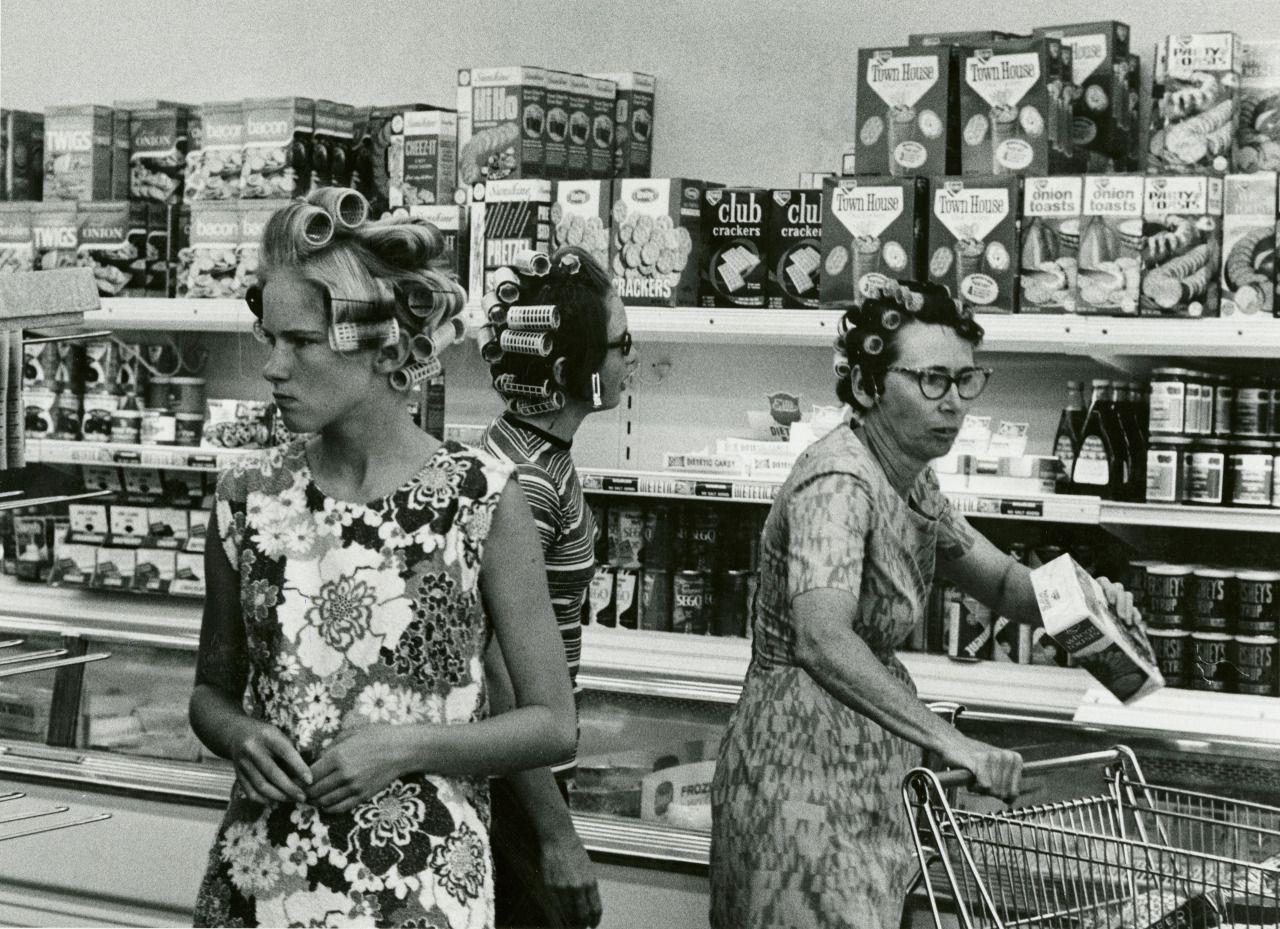By Katerina Taxiaropoulou,
It’s a hot summer day somewhere in the 1960s. We find ourselves inside America’s largest grocery retailer, the iconic A&P. Sammy, a teenage clerk, stands behind the cash register, watching and criticizing the monotonous lives of the customers. Suddenly, his attention is caught by a group of girls who enter the store only wearing swimsuits. He ogles them, fantasizing about details about their lives and labelling their personalities based solely on their appearance. His daydreaming is over when Lengel, his manager, reprimands the girls and asks them to cover their shoulders. Sammy then removes his apron and, in a rash, resigns. As he walks out, he sees that the girls have already left, oblivious to his act of chivalry. Thus, with neither a girlfriend nor a job, Sammy realizes how expendable his role is and becomes overwhelmed by fear.
Produced at a time of unprecedented economic prosperity, John Updike’s 1961 short story “A&P” features America’s great culture of consumption as it was strategically developed to account for Western capitalism’s superiority. This political ideology of affluence and materialistic abundance was translated into a practical set of values to be internalized and enacted by the individual in everyday common activities, such as shopping. In Updike’s A&P grocery store, a center of consumption, the subjects’ fervent preoccupation with performing or negating their predetermined roles within consumerism’s framework creates for them the illusion of power and heroism.
To begin with, the customers think of themselves as free agents who make informed decisions about their own unique lives, while in reality, they have lost their individuality in the mechanical service of consumerism’s bigger agenda. Michel de Certeau, in his book “The Practice of Everyday Life” (1984) argues that in physical spaces of consumption, the weak can only for a moment “gain validity” (38), that is a sense of power or control, by “using the constraining order” (30), the rules as defined by the strong. In abiding by consumerist routines like pushing their carts in a single downward direction, the customers at A&P feel confident that they are making rational, willful decisions based on their own individual needs, while really, they appear to have lost their sense of selfhood, acquiring a mob mentality that not only denies them any form of power but also drains all their ability to think.
Convinced by consumerism’s narrative of self-fulfillment, the customers fail to see that a lack of purpose and joy has rendered their lives empty of meaning. According to Sue McGregor, consumerism can be defined as the “acceptance of consumption” as the ultimate path to “self-realization” or the “misplaced belief (the myth) that the individual will be gratified by consuming” (qtd. in Stearns et. al., 396).
For the middle-class suburban clientele, an abundance of material goods indicates success. The truth is, however, that they lead empty, spiritless lives as they move about the store with no particular aim other than to kill their time. In contrast, Sammy, a lower-class youth wishing for a meaningful life, is absolutely frustrated by “the joyless, wooden nature of their existence” (Porter 1156). On a second level of consumerism-conditioned numbness, these people are incapable of experiencing authentic joy. As Sammy remarks, they live in northern Boston, and yet many “have not seen the ocean for twenty years” (132). So, in this mise en scène of racks full of stacked packages of candy bars and herring snacks brightly lit, consumers appear to have become the dim props of their own lives.

Moving up in the hierarchy of A&P, Lengel, the manager, seems similarly self-deluded, as his claim to Christian spirituality is ironically contrasted by his high position within a capitalist, profit-driven structure. As Bezdoode explains, the church deems “capitalist policies” of wealth accumulation and material possession “immoral” (79). Lengel, as a teacher at Sunday school, preaches about Christian values and their power to elevate believers above material reality as spiritual beings, firm against secular pleasures. Consequently, he sees himself as a role model and a rightful guardian of these values. Yet, his role in securing profit in a center of consumption is quite materialistic. In this sense, Lengel, who attacks the girls on the issue of decency, is an immoral hypocrite, or “a parody of a true Christian figure” (Bezdoode 79). A caricature of a preacher, Lengel is therefore by no means morally superior to the other customers.
Sammy’s flamboyant opposition to consumerist rationale is likewise insincere, as the mechanisms of categorization and objectification underlie most of his thoughts. Stearns et al. acknowledge that the capitalist economy, the cornerstone of consumerism, “demands” (402) a taxonomic logic that turns everyone and everything into calculable objects with no self-defining power. Sammy mocks relentlessly these classifying and commodifying processes, yet the way he perceives the world around him shows that he has actually internalized them. As an immature adolescent, Sammy tends to “make blanket judgments hastily and to place all individuals in their nearest category” (Porter 1156). He classifies, for example, the women in the store by level of appeal as the witch-like “cash register watchers,” “the houseslaves in pin curlers,” “the women with six children and varicose veins,” and of course, there are the three bathing beauties, whose appearance he further classifies; “Queenie’s” beauty is exceptional. Perhaps unconsciously, Sammy sexualizes Queenie, reducing her body to a commodity to be consumed or to a map of arbitrary signifiers. He has never met her before, yet he readily interprets her unconventional attire as an instance of “consumptive resistance” or “an act of rebellion” (Stearns et. al., 406) against middle-class conservative values. While he assesses her inner motives, just like an object, she remains silent.

As for his purported anti-consumerist freethinking, his final act of anti-conformism is not to be trusted either. The ambiguity in Sammy’s motives, as well as his later evident regret, demonstrate that his resignation did not come from a point of chivalric defense of high ideals. According to Bezdoode, the agent of a “meaningful action is conscious of [their] action”, as they have measured the possible outcomes in advance. On the other hand, Sammy’s decision to quit appears quite impulsive—an emotional reaction rather than a rational action—purposed to solidify a fully developed life philosophy. Indeed, Sammy’s admitting to having exclaimed, “I quit… quick enough for them to hear,” indicates that his decision was most probably motivated by his pubertal physical attraction to the girls.
In that sense, Sammy is transforming into what he dreads. Like the customers, he is behaving mindlessly, like a slave, to the female body, which he has mentally commodified. Like Lengel, he is turning into a hypocrite. When the girls’ apathy and his liminal position in society dawn on him, he seems to regret his decision, fearing “how hard the world was going to be to [him] hereafter.” He is no knight defending anti-conformism, much like Lengel is no guardian of Christian spirituality. Yet, it could be suggested that Sammy is elevated by the end, as he is the only one to become disillusioned and courageously endures “the lot” of his action (Porter 1158).
Within the physical space of consumption, consumerist patterns permeate people’s minds and so the notion of entrapment, also takes on an intellectual dimension. One needs to abandon not only the place, but the mentality too to be free.
References
- Heroism in the Age of Consumerism: The Emergence of a Moral Don Quixote in John Updike’s ‘A & P’. researchgate.net. Available here
- Certeau, Michel de. The Practice of Everyday Life. University of California Press, 1984.
- John Updike’s ‘A&P’: The Establishment and an Emersonian Cashier. Jstor.org. Available here




